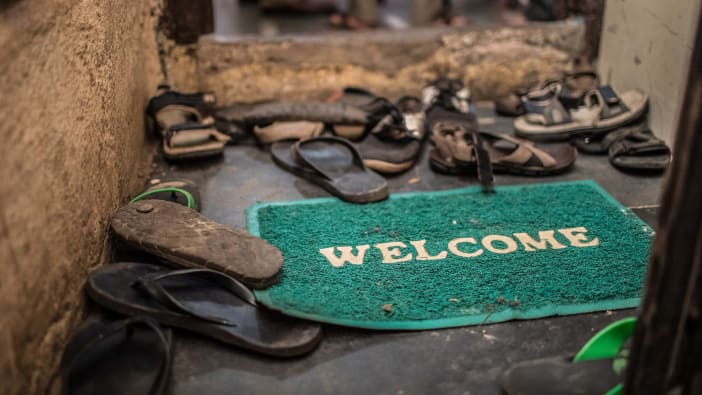Forgiveness is not as easy to practise as it is to preach, but it is an essential step towards reconciliation and living in harmony. Forgiveness includes letting go of the hurts and resentments we keep within ourselves. Forgiveness is difficult. It requires energy and time, yet it is possible to achieve if people really put their heart and soul into it. United Mission to Nepal (UMN) is an international Christian development organisation working in Nepal. We work in partnership with Nepali organisations in various areas of development, including peace and conflict transformation. One of UMN’s activities in this area is to help groups, families and individuals during times of conflict and to bring about forgiveness and reconciliation.
In one remote district where UMN works, a disagreement arose in the only church that exists in the whole district. The pastor had made the decision to change the denomination of this small church without consulting the church elders. Some elders resented this. They began to argue with each other, and some stopped attending church. UMN began to work with various church members to bring about reconciliation. Now, after a year (it does take time!), members are meeting together again. They have also registered the church as a community-based organisation in order to work together in helping the community. The things that helped us in facilitating the process of reconciliation were: trust, friendship, listening, understanding, communication and persistence.
Trust
Although we were outsiders, both sides trusted us, perhaps because we were not personally involved in the disagreement. It is important that mediators are independent, non-judgmental and trusted by everyone involved. This trust encouraged people to be open towards us when sharing their thoughts. They told us how they had been hurt and how they felt about others. They believed that we wanted to help them to sort out the problems. Trust is the foundation upon which healthy relationships can grow. Trust depends on:
- knowing each other well
- time and patience: it takes time to develop trust
- having a common faith. Whenever we visited, we went to the church services, shared the stories of our lives and spent time together with the local believers.
A friend who listens
One of the most important things we did was simply to be there when needed and to listen without being judgmental or biased. Listening is the best place to start when acting as a mediator. As a minority community, the members of the church were used to working very closely together and sharing their experiences with each other. They often met to plan work together, or gather for informal chats and Bible studies, which were opportunities for sharing sorrows, joys and prayers, along with drinking tea. All this stopped once the tension started, so they were relieved to share their stories with us when we visited them. We learned from both sides that they had missed having a close friend who listens sympathetically.
Helping people to understand the conflict
Another essential key to the reconciliation process was helping each individual to see the facts and reality of the problem. We used different tools and techniques to help them to understand the conflict and move towards accepting each other.
The Bible Because it was a faith group, the most powerful tools were Bible study and prayers. Our Bible studies focused on God’s love, forgiveness and reconciliation. We conducted the prayers and studies separately with the different groups and prayed constantly for God to show us the way to confession, repentance and reunion, which is what God wants for his people. We also used a Tearfund ROOTS book, Peace-building within our communities, as a reference for our Bible studies.
Analysis We used training and discussion to help each person to understand what conflict means, the types and stages of conflict and people’s responses towards it. Analysing the conflict was interesting and helpful. We looked at:
- the core problem
- how it started
- what the causes and effects were
- how to work out a solution.
We helped them to analyse the factors that can bring people together and also the ones that cause tension and divide people. During a meeting with the key people involved in the conflict we discussed and together identified the issues that added fuel to the conflict. Then we encouraged them to think creatively of as many ways as possible that they could minimise the effects. This built up confidence that it was possible to bring about reconciliation. Another tool is self-analysis. This helped people to understand their own faults and the part they played in the conflict, which led to repentance and the path towards forgiveness.
Communication
After understanding the problem and analysing the conflict, we discussed with each side what they thought the best solution was. When this decision had been made, it was communicated clearly to the other group. During our mediation role, we emphasised the sharing of positive perspectives and opinions with each side. This created a sense of good will. Then we facilitated a meeting between both sides so they could make a new start with a renewed hope.
Continuous nurture and care
When dealing with people’s hurts and feelings, continuous care and support is vital. We showed our care and support through our prayers, by listening attentively, by showing concern and interest in settling the problem, visiting often and chatting with people. The Bible states that forgiveness and reconciliation are possible. To bring peace in a community, people have to keep in good relationship with God, with others, with creation and also with themselves.
Bal Kumari Gurung works with UMN as an advocacy advisor for conflict transformation work.
United Mission to Nepal
PO Box 126
Kathmandu
Nepal
- Email: [email protected]
Website: www.umn.org.np









